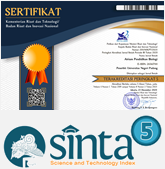Relationship of Multiple Intelligence with Cognitive Learning Outcomes of Students in Class VIII Science Subjects of SMP 13 Padang
Abstract
ABSTRACT
Intelligence is an ability, with its completeness process, which is capable of handling various problems. Each student has a tendency for intelligence from nine intelligences, namely Linguistic, Mathematical-Logical, Visual-Spatial, Intrapersonal, Naturalist, and Existential. This intelligence is called Multiple Intelligence. This research is a descriptive study, using a correlational study approach between multiple intelligences and student learning outcomes. To find out the relationship between variables, a correlation test was used using the Spearman-Rank correlation. The data obtained were analyzed by normality test. The results obtained in the form of population data are normally distributed. Furthermore, the data analyzed using correlation analysis with the results in the form of correlation variables that have no effect. Based on the results of the study in general it can be concluded that the intelligence of multiple intelligence has a significantly different relationship to learning outcomes. Although with a significantly different level of correlation, but multiple intelligence still has a relationship with learning outcomes, the point is that if the correlation coefficient increases, the learning outcomes of students will be more dominant. The coefficient of determination is 24.85% and 7.99% shows that learning outcomes in science subjects in class VIII 4 and class VIII 5 are influenced by multiple intelligences.
Keywords: multiple intelligence, cognitive learning outcomes
Full Text:
FullpaperDOI: http://dx.doi.org/10.24036/apb.v4i1.4650
DOI (Fullpaper): http://dx.doi.org/10.24036/apb.v4i1.4650.g2725




